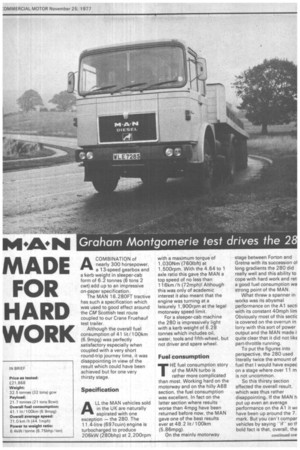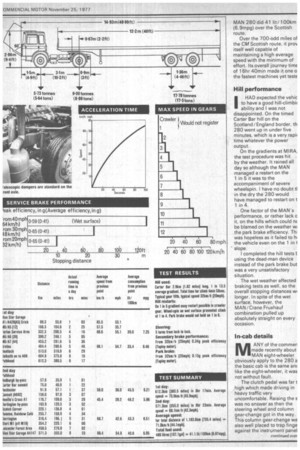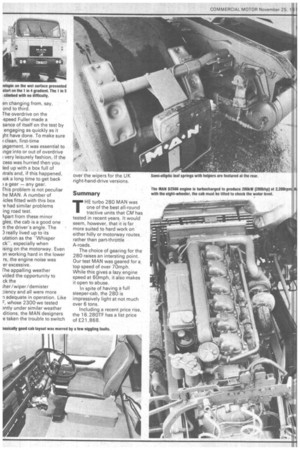MADE FOR HARD WORK
Page 49

Page 51

Page 52

If you've noticed an error in this article please click here to report it so we can fix it.
IN BRIEF Price as tested: £21,868 Weight: 32.5 tonnes (32 tons) gcw Payload: 21 7 tonnes (21 tons 8cwt) Overall fuel consumption: 41.1 lit/100km (6.9mpg) Overall average speed: 71.0 km/h (44.1mph) Power to weight ratio: 6.4kW/tonne (8.751)hp/ton)
ACOMBINATION of nearly 300 horsepower, a 13-speed gearbox and a'kerb weight in sleeper-cab form of 6.2 tonnes (6 tons 2 cwt) add up to an impressive on-paper specification.
The MAN 16.280FT tractive has such a specification which was used to good effect around the CM Scottish test route coupled to our Crane Fruehauf test trailer.
Although the overall fuel consumption of 41 lit/100km (6.9mpg) was perfectly satisfactory especially when coupled with a very short round-trip journey time, it was disappointing in view of the result which could have been achieved but for one very thirsty stage.
Specification ALL the MAN vehicles sold in the UK are naturally aspirated with one exception — the 280. The 11.4-litre (697cuin) engine is turbocharged to produce 206kW (280bhp) at 2,200rpm
with a maximum torque of 1,030Nm (760Ibft) at 1,500rpm. With the 4.64 to 1 axle ratio this gave the MAN a top speed of no less than 116km/h (72mph)! Although this was only of academic interest it also meant that the engine was turning at a leisurely 1,900rpm at the legal motorway speed limit.
For a sleeper-cab machine the 280 is impressively light with a kerb weight of 6.28 tonnes which includes oil, water, tools and fifth-wheel, but not driver and spare wheel.
Fuel consumption THE fuel consumption story of the MAN turbo is rather more complicated than most. Working hard on the motorway and on the hilly A68 section, the fuel consumption was excellent. In fact on the latter section where results worse than 4mpg have been returned before now, the MAN gave one of the best results ever at 48.2 lit/100km (5.86mpg).
On the mainly motorway stage between Forton and Gretna with its succession ol long gradients the 280 did really well and this ability to cope with hard work and retl a good fuel consumption wa strong point of the MAN.
What threw a spanner in works was its abysmal performance on the Al secti with its constant 40mph lim Obviously most of this sectic is covered on the overrun in lorry with this sort of power output and the MAN made i. quite clear that it did not likE part-throttle running.
To put the figures into perspective, the 280 used literally twice the amount of fuel that I would have expec on a stage where over 11 m is not uncommon.
So this thirsty section affected the overall result, which was thus rather disappointing. If the MAN h put up even an average performance on the Al it vv( have been up around the 7. mark. But you can't compar vehicles by saying "ifso tlbold fact is that, overall, the
MAN 280 did 41 lit/ 100km (6.9mpg) over the Scottish route.
Over the 700-odd miles of the CM Scottish route, it prov itself well capable of maintaining a high average speed with the minimum of effort. Its overall journey time of 16hr 40min made it one o the fastest machines yet testE Hill performance IHAD expected the vehic to have a good hill-climbil ability and I was not disappointed. On the timed Carter Bar hill on the Scotland/ England border, th 280 went up in under five minutes, which is a very moil time whatever the power output.
On the gradients at MIRA, the test procedure was hit . by the weather. It rained all day so although the MAN managed a restart on the 1 in 5 it was to the accompaniment of severe wheelspin. I have no doubt tl in the dry the 280 would have managed to restart on t 1 in 4.
One factor of the MAN's performance, or rather lack a it, on the hills which could n( be blamed on the weather v14 the park brake efficiency. Thl was hopeless as it failed to hl the vehicle even On the 1 in I slope.
I completed the hill tests k using the dead-man device instead of the park brake but was a very unsatisfactory situation.
The wet weather affected braking tests as well, so the overall stopping distances vvi longer. In spite of the wet surface, however, the MAN/Crane Fruehauf combination pulled up absolutely straight on every occasion.
In-cab details MANY of the commen made recently about MAN eight-wheeler obviously apply to the 280 a the basic cab is the same an like the eight-wheeler, it was not without fault.
The clutch pedal was far t °high which made driving in heavy traffic very uncomfortable. Raising the s was no answer as then the steering wheel and column gear-change got in the way. This column gear-change wa also well placed to trap finge against the instrument panel
en changing from, say, ond to third.
the overdrive on the -speed Fuller made a sance of itself on the test by engaging as quickly as it Oat have done. To make sure clean, first-time jagement, it was essential to .nge into or out of overdrive I very leisurely fashion. If the cess was hurried then you led up with a box full of itrals and, if this happened, mak a long time to get back ) a gear — any gear.
rhis problem is not peculiar he MAN. A number of icles fitted with this box 'e had similar problems ing road test.
.part from these minor
gles, the cab is a good one n the driver's angle. The ) really lived up to its utation as the "Whisper
ck-, especially when
ising on the motorway. Even
3n working hard in the lower
rs, the engine noise was or excessive.
rhe appalling weather vided the opportunity to ck the her :iency and all were more a adequate in operation. Like =, whose 2300 we tested ?.ntly under similar weather ditions, the MAN designers e taken the trouble to switch
Summary THE turbo 280 MAN was one of the best all-round tractive units that CM has tested in recent years. It would seem, however, that it is far more suited to hard work on either hilly or motorway routes rather than part-throttle A-roads.
The choice of gearing for the 280 raises an intersting point. Our test MAN was geared for a top speed of over 70mph. While this gives a lazy engine speed at 60mph, it also makes it open to abuse.
In spite of having a full sleeper-cab, the 280 is impressively light at not much over 6 tons.
Including a recent price rise, the 16.280TF has a list price of £21,868.










































































































